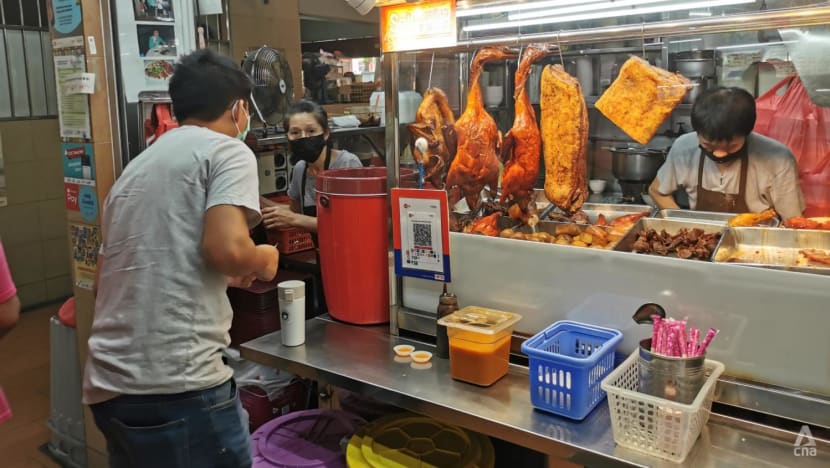A week into Malaysia's chicken export ban: Some stalls in Singapore close while others find solutions

Mr Ong Eng Koon's chicken rice stall at Pek Kio Market and Food Centre on Jun 8, 2022. The stallholder used frozen chicken for his dish, something he hasn't done in 10 years. (Photo: CNA/Jalelah Abu Baker)
SINGAPORE: The last of the fresh poultry supply from Malaysia arrived at Mr Ong Eng Koon's chicken rice stall on Tuesday (Jun 7).
On Wednesday, he did something he has not done since a bird flu scare years ago - he served the popular dish using chicken cooked from a frozen batch.
The result? A success.
The 10 frozen chickens he cooked were sold out within two hours.
By 11.30am, chicken was conspicuously missing from his display, leaving behind other meats for the duck rice and char siew rice he sells.
"They ate. They said (it's) good," Mr Ong told CNA, visibly happy that he took the leap of faith.
He previously told CNA that he may have to depend on the sale of other dishes to survive, although chicken rice is his bestseller.
On Wednesday when CNA visited him, he said that he made no changes to the cooking method or flavours.
Mr Ong, who has been running his stall at Pek Kio Market and Food Centre for 25 years, said he plans to continue serving chicken rice with the frozen alternative, given that it was well-received.
However, another chicken rice shop within the hawker centre was shut when CNA visited, a result of Malaysia's chicken export ban, said Mr Ong.
While prices remained the same at the veteran's stall, a check at well-known chicken rice chain Boon Tong Kee's Balestier outlet showed that a chicken rice combo now costs S$6 without GST, an increase of S$0.50 which took effect on Jun 1.
Its signature boiled (poached) chicken dish also costs S$36 without GST, up from S$32.
CONTINUED SUPPLY
Amid the uncertainty of what the curbs would bring, Mr Affandi Abdul Rahman, who runs a chicken rice and ayam penyet shop at Marine Parade Central Market and Food Centre with his family, is relieved that he can still keep his business running.
His Malaysian supplier of 14 years is still supplying him with chilled chicken, although Mr Affandi said he is not sure where the chicken comes from as his father deals with that side of the business.
He previously lamented that using frozen chicken will result in less than ideal taste, pointing to inferior texture and lack of a nice after-taste when served.
On Wednesday, Mr Affandi told CNA that his trusted supplier has found a solution to deliver the chicken.
"We want the least hassle, so he will do the hassle, he will find a supplier. Anyway, he's not only doing (this) for us, he's doing for many of the stallholders, shops," he said.
SITUATION AT A WET MARKET
At a wet market CNA visited, things were relatively quiet.
Footfall was scant at Beo Crescent Market on Wednesday morning around 9am, a change from the usual crowds CNA observed before the chicken export ban.
However, halal poultry stall Nur Muhammad Meat Enterprise told CNA that customers are still buying frozen chicken.
"I’ve been selling frozen chicken for 20 years. No problem. But last time, 1kg S$5, now S$10," said stallholder 33-year-old Nur Muhammad.
"But for frozen items, the price already rose during Hari Raya," he added, explaining that he already saw prices increasing before the export ban took effect.
Still, some stalls appeared to have been affected. At Kim Heng Frozen Food, there was still a full display of frozen chicken.
Its stallholder, who only wanted to be known as Mr Tan, said he's seen fewer customers since the export ban kicked in a week ago.
He noted that his neighbouring stall Swee Heng Fresh Chicken Shop – which CNA patronised several times prior to the export ban – had been closed for about a week.
"People don’t like frozen. If (there aren't stalls selling) pork or fish or fresh veggie, there will be (fewer) customers. People still prefer fresh chicken," said Mr Tan.
And those who opt for frozen chicken would buy from some supermarkets where the chicken is slightly more affordable, the 60-year-old stallholder said.
Asked how he would cope with the dip in the number of customers, Mr Tan said it's "just a matter of getting used to it".
"Maybe eventually people will come back, because they have no choice. We cannot rely on Malaysia," he added.
















